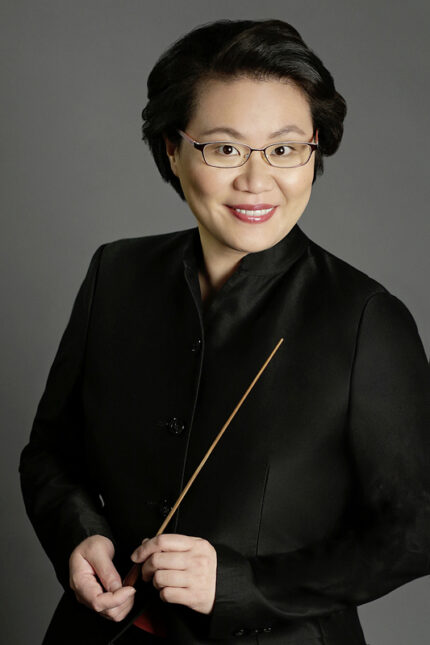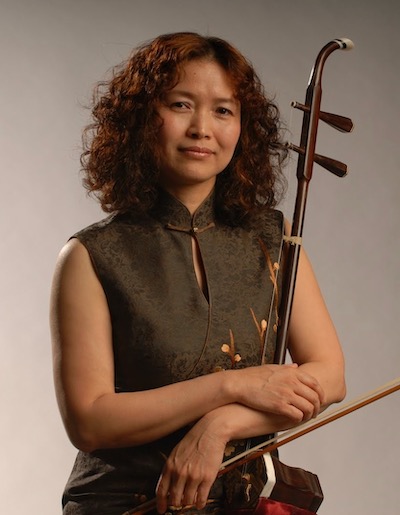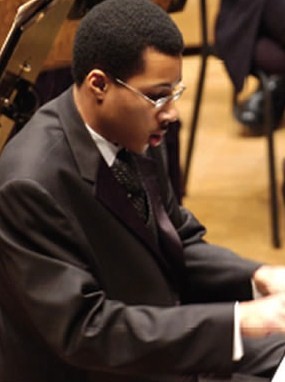West meets East as Sinfonietta kicks off transitional season

The Chicago Sinfonietta’s 23rd season marks a gradual changing of the guard. A variety of guest conductors will take the helm of the orchestra for what, in essence, is a round of public auditions for the opportunity to succeed Paul Freeman, the Sinfonietta’s founder and outgoing music director.
Sunday afternoon’s generous season-opening program at Dominican University in River Forest—to be repeated Monday night at Orchestra Hall—presented the local debut of the Taiwan-born conductor Mei-Ann Chen, along with two talented concerto soloists.
Chen, former assistant conductor of the Atlanta Symphony who is taking up the same post in Baltimore this fall, looks like a gently amiable college professor, yet she is clearly a dynamic figure firmly in charge on the podium. The Sabei Dance (from Sabei Suite No. 2 by the Chinese-Canadian composer An-Lun Huang) offers a kind of Eastern-flavored Khachaturian yet made a rousing opener, with Chen drawing a blazing and propulsive performance from the Sinfonietta.
Chen was equally impressive in the more subdued canvas of Ravel’s Ma Mere l’Oye (Mother Goose). The Sinfonietta couldn’t quite deliver the requisite luminosity and tonal sheen, but this was a sensitive rendering, alive to the piquant chinoiserie of Laideronnette and presenting a notably characterful Belle et la Bete, the performance mitigated by some less-than-ethereal string solos in the Jardin Feerique finale.
The Butterfly Lovers Concerto is a hugely popular work in China, and, increasingly, the rather complex tale of tragic, transcendent love by Chen Gang and He Zhanhao is proving a guilty pleasure for many Western violinists, including Gil Shaham.
Sunday’s concert offered the rare opportunity to hear the concerto, not in its standard violin version but performed on the erhu by soloist Betti Xiang.

The traditional Chinese stringed instrument, is similar to a body-less violin, though it is held upright and bowed across the front like a cello. The erhu produces a twangy, exotic—to Western ears—timbre, yet Xiang conjured a wide dynamic range and a surprising array of unearthly sounds from the instrument. The sentimental concerto is not exactly a timeless masterpiece but has undeniably lovely moments and was given a vital and expressive performance by Xiang with Chen eliciting highly responsive and energized playing from the orchestra.
In addition to providing a gracious introduction for guest maestra Chen, Freeman took the podium for the afternoon’s other soloist, pianist Jeremy Jordan.

A product of Chicago’s Walter Payton College Preparatory School, Jordan first performed with the Sinfonietta at age 17— “our mascot,” as Freeman called him Sunday. Now 20 and a student at Juilliard, the solemn young man showed himself a greatly gifted pianist, blessed with a steel-fingered technique and a poetic sensibility well suited to Rachmaninoff ‘s Piano Concerto No. 1.
The youthful effort, written at age 19 and later substantially revised, remains the least played of the composer’s five piano concertante works, but the young Chicago native made a strong case for this neglected music. Rachmaninoff’s themes may be less indelible than in his later concertos and the finale goes on longer than it needs to, but the First still has its attractions, cast in Rachmaninoff’s brand of rhapsodic Russian melodism.
Jordan was alive to the caprice-like solo writing as well as the moments of unbridled virtuosity bringing imposing power to the first-movement cadenza and blazing prestidigitation to the final pages. Freeman and the orchestra provided equally fiery support.
The pianist showed more bravura and a wry wit with an unorthodox Wagner encore—-Jordan’s own clever and effective transcription of Siegfried’s Funeral March, the fistfuls of notes thrown off with impressive accuracy and sonorous impact.
______________________________________________________
It takes a particular type of clueless indulgence to bring an infant to a symphony concert. Sunday’s fine Sinfonietta performance was repeatedly interrupted by cries and noise from a baby brought by an imbecilic father who insisted on staying even after two ladies in the audience requested they leave due to the child disturbing the performance. (Hint: Moving to the back row doesn’t make your kid less audible.)
Shame on the Sinfonietta and theater staff for failing to address the situation, leaving it up to audience members to attempt to resolve it. If, as one annoyed Sinfonietta regular complained, the father is the spouse of an orchestra member, that’s an even greater outrage. Allowing musicians to bring babies to concerts and nearly ruin the performance is blindly self-defeating and shows contempt for the Sinfonietta’s more professional musicians, as well as guest artists and the audience.
Next time leave the kid at home and pay someone to look after her. The audience didn’t buy tickets and drive to the concert to act as your involuntary babysitters.
The program will be repeated 7:30 p.m. Monday at Symphony Center. www.chicagosinfonietta.org; 312-236-3681.
Posted in Performances


Posted Oct 04, 2009 at 9:51 pm by Michael P. Scott
The Butterfly Lovers is a very nice piano concerto, too. Seldom recorded but worth a listen if you can find it. I like it much better than the Yellow River concerto.
MPS
Posted Oct 05, 2009 at 2:51 pm by deborah jordan-ketchum
This young man is awesome and we are so very proud of him. As we watch him grow and excel he truly amazes our family. We love him so very much. We encourage him to go forth in all his endeavors. Uncle & Aunt of Aurora